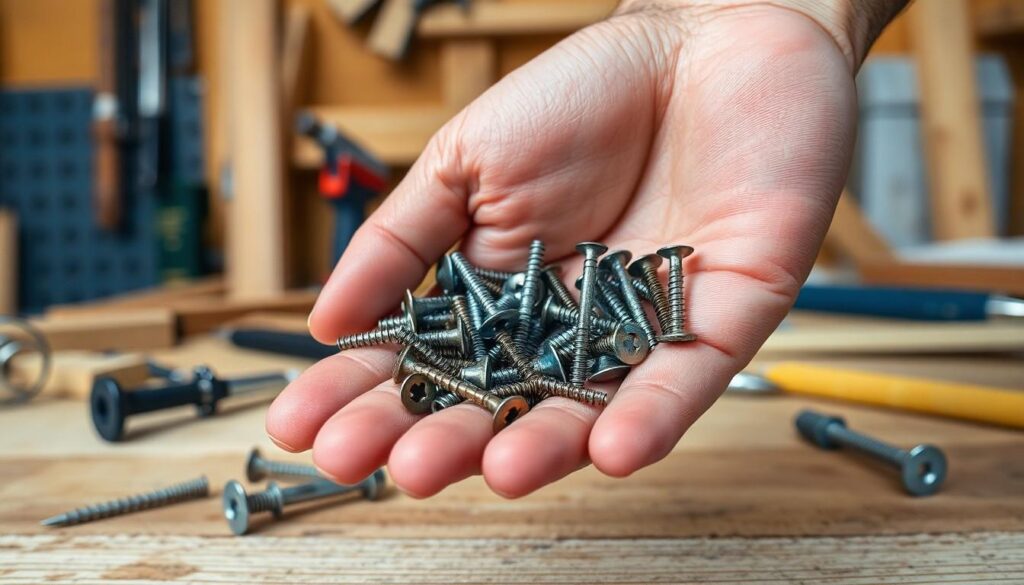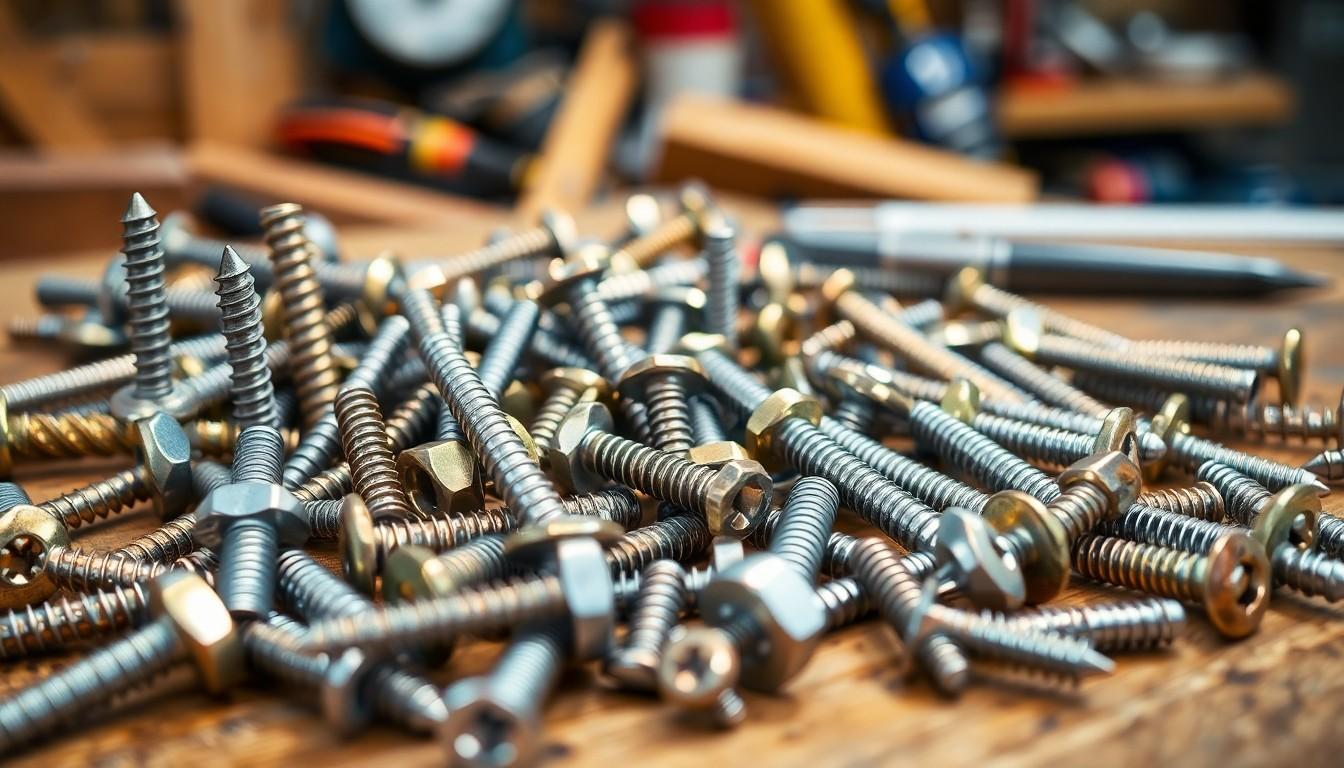When it comes to construction and DIY projects, tech screws are the unsung heroes lurking in the toolbox. They may not have the glitz and glamour of power drills or the charm of a trusty hammer, but these little wonders pack a punch. Designed for maximum grip and efficiency, tech screws hold everything together like the glue in a questionable family reunion.
Imagine trying to assemble furniture without these little marvels. It’d be like trying to bake a cake without flour—messy and utterly disappointing. Whether you’re a seasoned builder or a weekend warrior, understanding tech screws is essential. They’re the secret sauce that makes your projects not just stand, but thrive. So, let’s dive into the world of tech screws and discover why they deserve a prime spot in every toolkit.
Table of Contents
ToggleOverview of Tech Screws
Tech screws serve as indispensable fasteners in construction and DIY projects. These screws feature a self-tapping design, enabling them to create their own pilot holes in various materials. Typically, they find applications in wood, metal, and plastic, allowing for versatile usage.
Various types of tech screws exist, including composite, masonry, and sheet metal screws. Composite screws assist in joining PVC and fiberglass materials. Masonry screws anchor concrete or brick applications, providing additional strength and durability. Sheet metal screws are ideal for fastening metal components, ensuring solid connections.
Sizes of tech screws range from small to large, catering to different project requirements. The length usually varies from 1 inch to 6 inches, accommodating various thicknesses of joining materials. Screw diameters also differ, typically ranging from #4 to #14, depending on load requirements and material types.
Materials for tech screws include stainless steel, carbon steel, and zinc-coated steel. Stainless steel screws resist corrosion, making them suitable for outdoor use. Carbon steel screws provide strength and are often used in indoor projects. Zinc-coated screws offer corrosion resistance at a lower cost, appealing to budget-conscious builders.
Tech screws feature different head types, including pan, flat, and hex heads. Pan heads provide a larger bearing surface, while flat heads allow for a flush fit. Hex heads require a wrench for installation and removal, ensuring a secure grip during use.
Understanding the properties of tech screws enables builders of all skill levels to achieve reliable results. Knowing the right type, size, and material contributes to the overall quality and strength of projects. Tech screws, while often overlooked, enhance durability and efficiency in construction and furniture assembly.
Types of Tech Screws

Tech screws come in various types, each designed for specific applications, enhancing their utility in diverse projects.
Self-Tapping Tech Screws
Self-tapping tech screws create their own pilot holes, simplifying installation in hard materials. Manufacturers design these screws to cut through wood, metal, and plastic without requiring pre-drilling. This feature gained popularity due to the efficiency it brings, allowing faster assembly times. Sizes generally range from 1 inch to 6 inches, accommodating many projects. Many builders appreciate the unique ability of self-tapping screws to enhance grip and stability, making them a staple in both DIY and professional settings.
Tech Screws for Wood
Wood tech screws feature sharp threads for effective fastening in wood materials. Their design allows for a secure hold that prevents splitting and cracking during installation. Typically available in various lengths, they can range from 1 inch to 4 inches. Builders often choose treated or coated versions to improve corrosion resistance. Using the correct size is crucial; larger screws handle heavier loads, ensuring structural integrity for furniture and structures alike.
Tech Screws for Metal
Metal tech screws provide superior performance when fastening metal substrates. Their hardened steel construction offers strength and durability, making them suitable for challenging metal applications. Sizes often extend from 1 inch to 6 inches, allowing flexibility based on project needs. Builders often rely on these screws with either coarse or fine threads, each serving different functions. Choosing the right type ensures secure connections, maintaining the overall strength of metallic assemblies.
Applications of Tech Screws
Tech screws play a vital role in various industries, showcasing their versatility and efficiency.
Construction Industry
Tech screws are essential in the construction industry. They provide secure fastening solutions for wood, metal, and composite materials. Builders utilize self-tapping screws to eliminate the need for pre-drilling, saving time and effort. Masonry screws, renowned for their ability to fasten into concrete, enhance structural integrity. Their corrosion-resistant coatings ensure durability in outdoor settings. Sizes of tech screws are carefully selected based on project requirements, with longer screws typically used for heavy-duty applications. By choosing the correct type, contractors can achieve reliable outcomes that meet safety standards.
Automotive Industry
Tech screws are widely used in the automotive industry, contributing to vehicle assembly and repair. These screws secure engine components and body panels with precision. Self-locking tech screws prevent loosening during vibrations, ensuring optimal performance. For lightweight materials like aluminum, specialized tech screws offer improved fastening capabilities. Corrosion-resistant options protect against harsh environmental factors, prolonging the lifespan of automotive parts. Furthermore, the variety of head styles allows technicians to select the best option for specific assembly tasks, enhancing efficiency during production processes.
Electronics
Tech screws find significant applications in the electronics sector, holding components together. Such screws maintain structural integrity in devices like smartphones and laptops. Precision is crucial here, as the size and thread type must align perfectly with the materials used. Tech screws designed for electronics often feature low-profile heads, allowing for sleek designs. Additionally, these screws prevent damage to delicate components during installation and maintenance. With their diverse range of materials, including stainless steel and plastic, tech screws provide flexibility based on the environmental conditions and device requirements.
Advantages of Using Tech Screws
Tech screws offer several advantages that enhance their value in construction and DIY projects. One key benefit is their self-tapping design, which eliminates the need for pre-drilling in many materials. This feature saves time and effort, allowing for quicker project completion.
Durability stands out as another advantage. Tech screws made from stainless steel or zinc-coated steel provide corrosion resistance, ensuring long-lasting performance under various environmental conditions. Builders can rely on these materials to resist rust and wear, contributing to project longevity.
Versatility plays a crucial role as well. Tech screws suit various applications, from wood and metal to plastics and composites. This adaptability means they can effectively handle diverse fastening needs across industries, whether in construction, automotive assembly, or electronics.
The range of sizes and types adds another layer of convenience. Available in lengths from 1 inch to 6 inches and diameters from #4 to #14, there’s a tech screw for nearly any project requirement. Builders can choose between different head types, such as pan, flat, and hex, ensuring the right fit for their specific fastening tasks.
Furthermore, tech screws are designed for easy installation. Their sharp threads grip materials firmly, securing connections without compromising strength. This reliability becomes essential, particularly in demanding applications where structural integrity is paramount.
Overall, the advantages of using tech screws enhance their appeal, making them indispensable in both professional and DIY contexts. Their efficiency, durability, versatility, and ease of use contribute significantly to the success of various projects.
Tech screws play a pivotal role in enhancing the quality and efficiency of construction and DIY projects. Their unique self-tapping design simplifies installation while providing strong and reliable connections across various materials. With a wide range of types sizes and materials available there’s a tech screw suited for nearly every application.
Understanding the specific benefits of each type empowers builders of all skill levels to achieve optimal results. Whether it’s for furniture assembly automotive applications or electronics tech screws are the unsung heroes that ensure durability and performance. Embracing these essential tools not only saves time but also elevates the overall integrity of any project.






